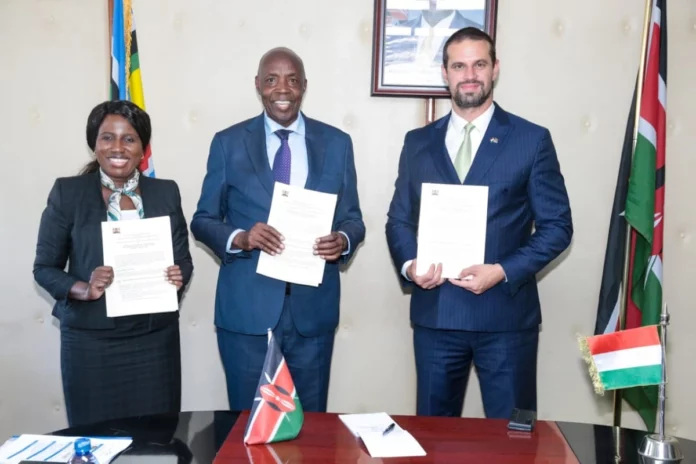The Ministry of Education in Kenya recently formalized a critical collaboration by signing a Memorandum of Understanding (MoU) with a prestigious Hungarian university. This landmark partnership signifies a significant stride towards uplifting technical skills, aiming to align the skillsets of Kenyan students with international standards. This article delves into the essential elements of the MoU, exploring its potential impact on technical education and identifying the key participants.
The Collaborators:
The MoU was signed by Education Cabinet Secretary Ezekiel Machogu and Hungarian Ambassador Zsolt Mészáros, solidifying a partnership between Kenya and Óbuda University. This collaboration extends to include two prominent Kenyan technical universities—the Technical University of Kenya (TUK) and Dedan Kimathi University of Technology (DeKUT). Their collective focus spans beyond skill development, aiming to fortify trainers at 13 National Polytechnics across the nation.
Areas of Focus:
Óbuda University, in collaboration with TUK and DeKUT, brings its expertise to address critical areas such as welding, mechatronics, and electronic engineering within Technical and Vocational Education and Training (TVET) institutions. This partnership is anticipated to significantly enhance the quality of technical education in Kenya.
Government Involvement:
Education Cabinet Secretary Ezekiel Machogu, expressing enthusiasm about the initiative and highlighting its potential to equip Kenyans with skills meeting global benchmarks, serves as the signatory on behalf of the Kenyan government. Principal Secretary for Higher Education Beatrice Inyangala and Vice Chancellors from TUK and DeKUT also underscored the collective effort towards advancing technical education during their attendance at the signing ceremony.
Extended Partnerships:
The Morendat Institute of Oil and Gas (MIOG), in addition to collaborating with TUK and DeKUT, actively participates in the exchange program by offering expertise in various oil- and gas-related courses. This strategic move expands the initiative’s scope, reflecting a comprehensive approach not only to technical education but also across diverse fields.
Role of TVETA:
The Technical and Vocational Education and Training Authority (TVETA) plays a crucial role in the successful implementation of the MoU. Functioning as an authoritative body and regulator, TVETA is involved in accreditation, quality assurance, and promoting continuous improvement through research-driven policies in technical and vocational education.
Duration and Future Prospects:
The MoU outlines a five-year collaborative effort with a promise of review for potential extensions and enhanced collaboration. This timeframe signifies a commitment to an enduring partnership capable of adapting to Kenya’s dynamic technical education landscape.
Opportunities for Kenyan Youth:
Hungarian Ambassador Zsolt Mészáros emphasized the exchange program’s potential to generate employment opportunities for young Kenyans domestically and internationally. This aligns with a broader goal of not only imparting skills but also nurturing pathways for practical workforce application.
Conclusion:
The collaborative effort between Kenya and Hungary marks a significant advancement in enhancing the country’s technical skills landscape. This initiative, uniting academic institutions, government bodies, and industry-focused entities, paves the way for a comprehensive approach to technical education. Over the subsequent five years, as this partnership develops, it is poised to make a substantial impact on Kenyan youth and the national workforce, demonstrating a commitment to excellence in international standards of training for technical skills.
